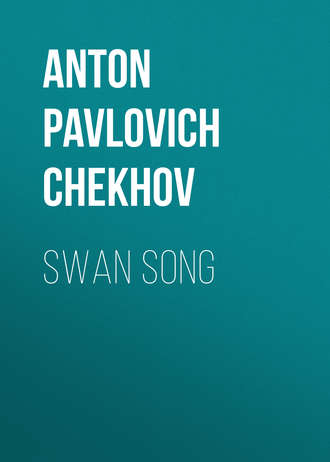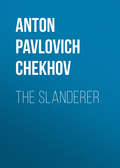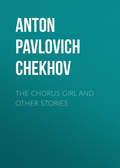
Антон Чехов
Swan Song
In 1890 Tchekoff made a journey to the Island of Saghalien, after which his health definitely failed, and the consumption, with which he had long been threatened, finally declared itself. His illness exiled him to the Crimea, and he spent his last ten years there, making frequent trips to Moscow to superintend the production of his four important plays, written during this period of his life.
“The Sea-Gull” appeared in 1896, and, after a failure in St. Petersburg, won instant success as soon as it was given on the stage of the Artists’ Theatre in Moscow. Of all Tchekoff’s plays, this one conforms most nearly to our Western conventions, and is therefore most easily appreciated here. In Trigorin the author gives us one of the rare glimpses of his own mind, for Tchekoff seldom put his own personality into the pictures of the life in which he took such immense interest.
In “The Sea-Gull” we see clearly the increase of Tchekoff’s power of analysis, which is remarkable in his next play, “The Three Sisters,” gloomiest of all his dramas.
“The Three Sisters,” produced in 1901, depends, even more than most of Tchekoff’s plays, on its interpretation, and it is almost essential to its appreciation that it should be seen rather than read. The atmosphere of gloom with which it is pervaded is a thousand times more intense when it comes to us across the foot-lights. In it Tchekoff probes the depths of human life with so sure a touch, and lights them with an insight so piercing, that the play made a deep impression when it appeared. This was also partly owing to the masterly way in which it was acted at the Artists’ Theatre in Moscow. The theme is, as usual, the greyness of provincial life, and the night is lit for his little group of characters by a flash of passion so intense that the darkness which succeeds it seems well-nigh intolerable.
“Uncle Vanya” followed “The Three Sisters,” and the poignant truth of the picture, together with the tender beauty of the last scene, touched his audience profoundly, both on the stage and when the play was afterward published.
“The Cherry Orchard” appeared in 1904 and was Tchekoff’s last play. At its production, just before his death, the author was feted as one of Russia’s greatest dramatists. Here it is not only country life that Tchekoff shows us, but Russian life and character in general, in which the old order is giving place to the new, and we see the practical, modern spirit invading the vague, aimless existence so dear to the owners of the cherry orchard. A new epoch was beginning, and at its dawn the singer of old, dim Russia was silenced.
In the year that saw the production of “The Cherry Orchard,” Tchekoff, the favourite of the Russian people, whom Tolstoi declared to be comparable as a writer of stories only to Maupassant, died suddenly in a little village of the Black Forest, whither he had gone a few weeks before in the hope of recovering his lost health.
Tchekoff, with an art peculiar to himself, in scattered scenes, in haphazard glimpses into the lives of his characters, in seemingly trivial conversations, has succeeded in so concentrating the atmosphere of the Russia of his day that we feel it in every line we read, oppressive as the mists that hang over a lake at dawn, and, like those mists, made visible to us by the light of an approaching day.
CHARACTERS
VASILI SVIETLOVIDOFF, a comedian, 68 years old
NIKITA IVANITCH, a prompter, an old man
The scene is laid on the stage of a country theatre, at night, after the play. To the right a row of rough, unpainted doors leading into the dressing-rooms. To the left and in the background the stage is encumbered with all sorts of rubbish. In the middle of the stage is an overturned stool
SVIETLOVIDOFF. [With a candle in his hand, comes out of a dressing-room and laughs] Well, well, this is funny! Here’s a good joke! I fell asleep in my dressing-room when the play was over, and there I was calmly snoring after everybody else had left the theatre. Ah! I’m a foolish old man, a poor old dodderer! I have been drinking again, and so I fell asleep in there, sitting up. That was clever! Good for you, old boy! [Calls] Yegorka! Petrushka! Where the devil are you? Petrushka! The scoundrels must be asleep, and an earthquake wouldn’t wake them now! Yegorka! [Picks up the stool, sits down, and puts the candle on the floor] Not a sound! Only echos answer me. I gave Yegorka and Petrushka each a tip to-day, and now they have disappeared without leaving a trace behind them. The rascals have gone off and have probably locked up the theatre. [Turns his head about] I’m drunk! Ugh! The play to-night was for my benefit, and it is disgusting to think how much beer and wine I have poured down my throat in honour of the occasion. Gracious! My body is burning all over, and I feel as if I had twenty tongues in my mouth. It is horrid! Idiotic! This poor old sinner is drunk again, and doesn’t even know what he has been celebrating! Ugh! My head is splitting, I am shivering all over, and I feel as dark and cold inside as a cellar! Even if I don’t mind ruining my health, I ought at least to remember my age, old idiot that I am! Yes, my old age! It’s no use! I can play the fool, and brag, and pretend to be young, but my life is really over now, I kiss my hand to the sixty-eight years that have gone by; I’ll never see them again! I have drained the bottle, only a few little drops are left at the bottom, nothing but the dregs. Yes, yes, that’s the case, Vasili, old boy. The time has come for you to rehearse the part of a mummy, whether you like it or not. Death is on its way to you. [Stares ahead of him] It is strange, though, that I have been on the stage now for forty-five years, and this is the first time I have seen a theatre at night, after the lights have been put out. The first time. [Walks up to the foot-lights] How dark it is! I can’t see a thing. Oh, yes, I can just make out the prompter’s box, and his desk; the rest is in pitch darkness, a black, bottomless pit, like a grave, in which death itself might be hiding… Brr… How cold it is! The wind blows out of the empty theatre as though out of a stone flue. What a place for ghosts! The shivers are running up and down my back. [Calls] Yegorka! Petrushka! Where are you both? What on earth makes me think of such gruesome things here? I must give up drinking; I’m an old man, I shan’t live much longer. At sixty-eight people go to church and prepare for death, but here I am – heavens! A profane old drunkard in this fool’s dress – I’m simply not fit to look at. I must go and change it at once… This is a dreadful place, I should die of fright sitting here all night. [Goes toward his dressing-room; at the same time NIKITA IVANITCH in a long white coat comes out of the dressing-room at the farthest end of the stage. SVIETLOVIDOFF sees IVANITCH – shrieks with terror and steps back] Who are you? What? What do you want? [Stamps his foot] Who are you?






